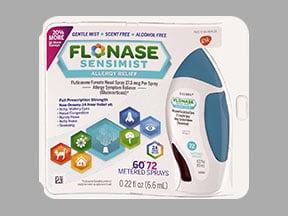
Flonase Sensimist Coupons & Savings Card – Discount Prices from $15.15
My prescription
Edit
5.9ML of 27.5MCG/SPRAY, Flonase Sensimist (1 Bottle)
Select pharmacy

Albertsons
$15.15
COUPON PRICE
Walgreens
$15.15
COUPON PRICEFlonase Sensimist savings card
Show this card to your pharmacist
Albertsons
$15.15
BIN
ID
PCN
GRP
011867
LH114E061E
HT
LABH001
Powered by
Price history for Flonase Sensimist
1 Bottle, 5.9ML of 27.5MCG/SPRAY
Average retail price for Flonase Sensimist
Average SaveHealth price for Flonase Sensimist
Our price history data is based on aggregated prescription data collected from participating pharmacies in America. Our prescription data updates daily to reflect the latest price changes. If you notice a missing data point, it means there wasn't sufficient data available to generate a monetary value for that date.
*Retail prices are based on pharmacy claims data, and may not be accurate when we don't have enough claims.
Flonase Sensimist dosage forms
Dosage Quantity Price from Per unit 5.9ML of 27.5MCG/SPRAY 1 Bottle $24.84 $24.84 5.9ML of 27.5MCG/SPRAY 2 Bottles $47.69 $23.84 5.9ML of 27.5MCG/SPRAY 3 Bottles $70.53 $23.51
| Dosage | Quantity | Price from | Per unit |
|---|---|---|---|
| 5.9ML of 27.5MCG/SPRAY | 1 Bottle | $24.84 | $24.84 |
| 5.9ML of 27.5MCG/SPRAY | 2 Bottles | $47.69 | $23.84 |
| 5.9ML of 27.5MCG/SPRAY | 3 Bottles | $70.53 | $23.51 |
What's the difference between regular Flonase and Sensimist?
Flonase and Flonase Sensimist are both nasal sprays used to treat allergy symptoms, but they have some differences. The primary difference lies in their formulation and delivery. Flonase contains fluticasone propionate, while Flonase Sensimist contains fluticasone furoate. Flonase Sensimist is designed to have a gentler mist and is alcohol-free, which may be more suitable for individuals with sensitive noses. Both are effective for treating nasal allergy symptoms, but the choice between them may depend on personal preference and sensitivity.
Does Flonase Sensimist have steroids in it?
Yes, Flonase Sensimist contains a corticosteroid called fluticasone furoate.
Using the SaveHealth discount card, what is the price of Flonase Sensimist without insurance?
Using the SaveHealth discount card, the price of Flonase Sensimist without insurance is $15.15.
What is the price of Flonase Sensimist at Walgreens?
The price of Flonase Sensimist at Walgreens is $15.15.
